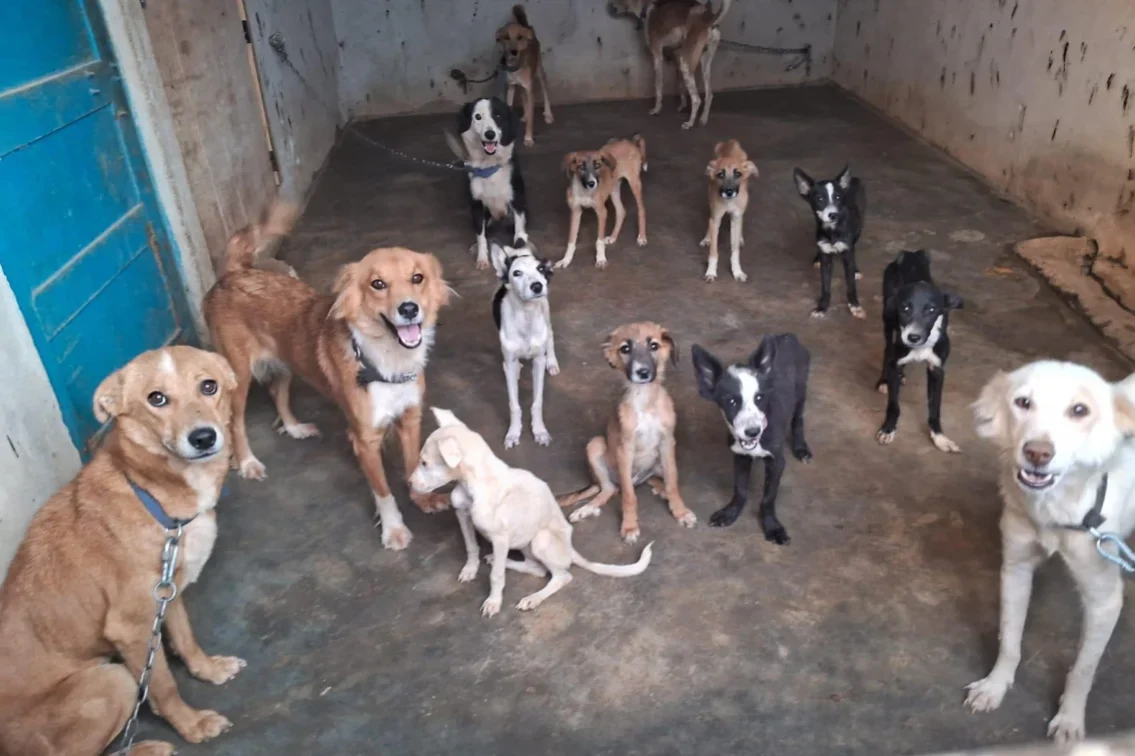विद्याविनयसम्पन्ने ब्राह्मणे गवि हस्तिनि |
शुनि चैव श्वपाके च पण्डिता: समदर्शिन:
Chapter 5 Verse 18 of the Bhagavad Gita says that a Bhraman (a priest who conducts worship ceremonies), a cow, an elephant, a dog and a person who engages in physical labour are one and the same. From the physical perspective, these species are contrasting. However, a truly learned person endowed with spiritual knowledge sees & treats them all as equal souls.
There are various instances in Hindu mythology too, which support this sacred belief that dogs are an integral part of our lives. Centuries-old wall carvings, statues and imagery of Hindu gods have feature canines – some of the revered deities being Dattatreya, Kal Bhairav, and Indra.
KAL BHAIRAV’S FONDNESS FOR DOGS
Kal Bhairav, a deity worshipped by Hindus, is believed to be the manifestation of Lord Shiva. Bhairav’s vahan (vehicle) is Shvan (dog) who stands guard at the entrance of Kashi, protecting the heavenly abode from external dangers. Another interpretation says that Bhairav, along with his dog as a weapon, protects the world from demons and his devotees from their “inner demons” such as greed, lust, fear and so on. According to ancient scriptures, the dogs of Kal Bhairav transform into four docile puppies embodying the Vedas who are sent to accompany Dattatreya.
A PAINTING WHICH SHOWS FOUR DOGS AS THE VEDAS
Dattatreya is venerated as a Hindu God and is believed to be an avatar of Brahma, Vishnu and Shiva. He is worshipped for His simple way of life, preaching kindness to all and sharing knowledge about the meaning of life with His disciples. Though his iconography varies across India, a painting by Raja Ravi Varma made in 1910 popularised the image of Dattatreya surrounded by a cow – the mother who nourishes all living beings – and four dogs who represent the four Vedas.
MAHABHARATA STARTS AND ENDS WITH CANINES
Other holy texts such as the Mahabharata also mention the presence of a dog:
One of the earlier episodes narrates the story of a yagna (ritual worship in front of a fire) being conducted by Janamejaya, the grandson of Abhimanyu. Outside the area where the ritual was being conducted, a small puppy who believed he was protecting any evil elements from entering the sacred place of worship was playing outside. However, some attendees of the yagna mercilessly beat the puppy complaining of its “dirty presence”. The puppy ran to Sarama (his mother, a celestial female dog) and complained of this cruelty.
She approached Janamejaya to ask about this cruelty, which raised the question that after all, the puppy was harmless so why did the attendees unnecessarily inflict pain on this poor creature? It is also for us to reflect on the current society about how people treat living beings as either equal to, lesser than or greater than us in power. How we engage with them is a true reflection of our character.
The ending of the Mahabharata also features a dog, who accompanied Yudhishtira to his final resting place. After a treacherous journey, the faithful companion arrives with the king at the gates of heaven where they are stopped by Lord Indra. While he agrees to permit Yudhishtira into heaven, he denies entry to the “old, dirty and skinny” dog. “The dog must come with me,” Yudhisthira insisted, again to be met by denial. In that case, he too refused to enter heaven leaving behind the loyal companion who walked by him every step of the way.
Touched by his virtues, Indra revealed that the dog was indeed dharma, which the king upheld even during his last moments. The dog transforms into the God of Dharma and blesses Yudhisthira for sticking to righteousness in all circumstances, thus making way for the king to enter heaven on Indra’s chariot.
A STORY OF SHIRDI SAI BABA AND DOGS
Another text revered by millions of Indians is the Sai Satcharita, a biography based on the life of Shirdi Sai Baba. Chapter 9, Leela 5 of this book is about a devotee who was residing at her home in Shirdi. Out of nowhere, a dog appears outside her house one afternoon and begins crying out of hunger. She gives it some food, which the dog relishes and eats immediately.
A few hours later, she goes to a masjid where Sai Baba was and He says, “Mother, you have fed Me sumptuously up to My throat, My afflicted pranas (life forces) have been satisfied. Always act like this, and this will stand you in good stead. Sitting in this masjid I shall never, never speak untruth. Take pity on Me like this. First, give bread to the hungry, and then eat yourself. Note this well.” Puzzled at this statement she asks Him how she could have fed Him when she herself is dependent on others for meals.
He reveals that the dog whom she fed earlier was indeed Sai Baba! He says, “The dog which you saw before meals and to which you gave the piece of bread is one with Me, so also other creatures (cats, pigs, flies, cows etc.) are one with Me. I am roaming in their forms. He who sees Me in all these creatures is My beloved.”
Other devotees have also shared accounts of Sai Baba appearing before them in the form of a black dog when they needed support during the darkest times of their lives. Dogs even according to astrology are considered auspicious – people suffering from the negative effects of the planets Rahu and Shani might find some respite when they feed stray dogs.
HOW WE TREAT OTHER LIVING BEINGS REFLECTS OUR CHARACTER
In a country like India where religion, beliefs, tradition and cultures criss-cross, innocent animals like dogs often get trapped in warped imagery that is often incorrectly depicted. Many consider them dirty, inauspicious, or unwanted creatures. However, when we begin to explore ancient scriptures and holy texts we realise that our assumptions might be polluted. Every book on the divine or the saints teaches us that all creatures must be treated as equals – be it a human, dog, cow or wild animal. It is up to us to imbibe the best of these beliefs and practice tolerance, kindness, equality and respect for all living beings.





